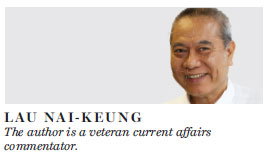Ex-chief justice's fears unfounded
Updated: 2015-10-06 08:35
By Lau Nai-keung(HK Edition)
|
|||||||||
Lau Nai-keung says a recent article by Andrew Li supporting overseas judges on the CFA provides no evidence of a deterioration in Hong Kong's judicial independence
Former chief justice Andrew Li Kwok-nang has defended the need for overseas judges in the Court of Final Appeal (CFA) in an op-ed penned for Ming Pao. His arguments go against the Basic Law and recent remarks made by prominent mainland legal scholars.
"What is special about the CFA, is that it has an overseas judge," Li wrote. "The fifth judge of the CFA is a veteran overseas judge from New Zealand, Australia or Britain The CFA can also have a fifth local judge, but this position has been held by an overseas judge since 1997."
With all due respect, what Li wrote is highly misleading. Instead of saying that "the CFA can also have a fifth local judge", it is more accurate to say the fifth judge of the CFA may be from overseas.
Article 82 of the Basic Law is clear on this: "The power of final adjudication of the Hong Kong Special Administrative Region shall be vested in the Court of Final Appeal of the Region, which may as required invite judges from other common law jurisdictions to sit on the Court of Final Appeal."
The Basic Law envisions a situation where there may be a need to invite judges from other common law jurisdictions to sit on the CFA. This is very sensible and broad-minded: Back in 1997, the newly established CFA might have needed help from the outside as it familiarized itself with being the final adjudicator in the SAR for the first time.
Li's suggestion, on the other hand, is quite different both in intention and substance. He is suggesting our CFA's uniqueness derives from the fact that we have an overseas judge on the bench and the presence of this overseas judge lends credibility to our "judicial independence". This is why, he argues, we should make the appointment of an overseas judge permanent.
So he is saying that we cannot trust the oh-so-important judicial independence to Chinese judges.
In his op-ed piece, Li also objected to the Standing Committee of the National People's Congress' (NPCSC) interpretation of the Basic Law in 1999 that overrode the top court's judgment on right-of-abode cases. "Although it would be legally valid and binding, such an interpretation would have an adverse effect on judicial independence in Hong Kong," he said.
"I believe that this view (that an NPCSC interpretation would harm Hong Kong's judicial independence) is widely shared in Hong Kong. However, my understanding is that it is not shared by the authorities in Beijing. They consider that an interpretation even after a court judgment should not adversely affect judicial independence in Hong Kong."
The concept of judicial independence can be interesting, especially when applied in Hong Kong's context.
Judicial independence is the concept that the judiciary needs to be kept away from other branches of government. That is, courts should not be subject to improper influence from the other branches of government, or from private or partisan interests in handling cases. Judicial independence is vital and important to the idea of separation of powers.
Our Basic Law uses the term "independent judicial power", which is ambiguous as to what that power is independent from. Everyone would agree that our judiciary should be independent from the executive and legislative. The problem is, the Basic Law also hints at judicial independence from Beijing.
Both Article 2 and Article 19 of the Basic Law stipulate that Hong Kong has an independent judicial power that includes "that of final adjudication". However, that power has to be exercised "in accordance with the provisions" of the Basic Law and "principles previously in force in Hong Kong shall be maintained".
"Principles previously in force in Hong Kong" was developed against the background that before July 1, 1997, Hong Kong was a British dependent territory, and the power of final adjudication on the laws of Hong Kong was vested in the Judicial Committee of the Privy Council in London. How and to what extent can we maintain these principles? One solution is to treat the NPCSC as a Privy Council, but with a twist and a much narrower scope of influence.
An independent judiciary and the jurisdiction of final adjudication are not the same. Hong Kong only enjoys the power of limited final adjudication, as is evident from the right-of-abode cases, where the NPCSC overrode the CFA's decision and which Li admits to be "legally valid and binding".
Li has produced no concrete evidence on the deterioration of our judicial independence whatsoever. What he was expressing was an unspoken fear - a fear that the colonial order that he is so accustomed to is falling apart and he wants to cling to this order by having foreign judges in the CFA forever.

(HK Edition 10/06/2015 page6)